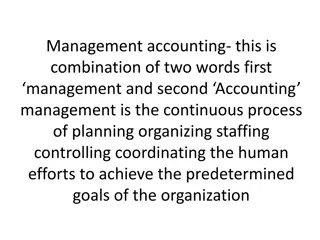Understanding the Significance of Departmental Accounting in Business Operations
Departmental accounting plays a crucial role in tracking departmental activities and financial information within an organization. It helps evaluate departmental performance, identify strengths and weaknesses, determine profitability, and guide decision-making for future growth and efficiency. This systematic approach enables better management control, aids in resource allocation, and promotes healthy competition among departments to drive overall profitability and success.
- Departmental Accounting
- Financial Management
- Business Operations
- Performance Evaluation
- Decision Making
Download Presentation

Please find below an Image/Link to download the presentation.
The content on the website is provided AS IS for your information and personal use only. It may not be sold, licensed, or shared on other websites without obtaining consent from the author. Download presentation by click this link. If you encounter any issues during the download, it is possible that the publisher has removed the file from their server.
E N D
Presentation Transcript
WELCOME WELCOME Class: Class: B.Com B.Com Part Subject: Financial Accounting Subject: Financial Accounting DEPARTMENTAL ACCOUNTING : A BASIC INTRODUCTION Part- -1 1 Topic Topic DEPARTMENTAL ACCOUNTING : A BASIC INTRODUCTION Prepared By Dr. SHAHID IQBAL Guest Faculty Marwari College, Darbhanga, Mobile no. and whatsup no. : 7004160257 Email ID: shahidlnmu@gmail.Com
MEANING OF DEPARTMENTAL ACCOUNTING: MEANING OF DEPARTMENTAL ACCOUNTING: A departmental accounting system is an accounting information system that records the activities and financial information about the department. Departmental Accounting is a vital one for large prosperous business organizations. It controls wastage & misusing, compensates the employee in terms of profit and commission, compares performance and progress of year to year or department to department or similar type of firm to firm. So it refers to maintaining accounts for one or more branches or departments of the company. Revenues and expenses of the department are recorded and reported separately. The departmental accounts are then consolidated into accounts of the head office to prepare financial statements of the company
Objectives of Departmental Accounting: Objectives of Departmental Accounting: The main objectives of departmental accounting are: a) To check out an interdepartmental performance. b) To evaluate the performance of the department with the previous period result. c) The gross profit of each department can ascertain. d) Unprofitable departments will reveal. e) The result of operations can use to determine the remuneration of managers of each department. f) The progress of each department can monitor for appropriate actions to take. g) To help the owner formulating the right policy for the future. h) To assist the management in deciding to drop or add a department. i) It helps in determining the commission of the department manager when it links to profit achieved by their department.
Advantages of Departmental Accounting: Advantages of Departmental Accounting: a) Individual results of each department can know which helps to compare the performances among all the departments, i.e., the trading results can compare. b) Departmental accounts help to understand or locate the success, failure, rates of profit, etc. c) It helps the management to make a proper plan of action, policies to increase profit after analyzing the results of the operation of various departments. d) Departmental accounting helps us to understand which department should be expanded further or which one should close down as per the results of the operation. e) It also helps to encourage a healthy competitive spirit among the various departments which, ultimately, helps to increase profits of the firm as a whole. f) For additions or alterations of various departments, departmental accounts help a lot as it supplies the necessary information. g) As detailed information about the firm is available from departmental accounting the users of accounting information, particularly, the auditors and investors widely benefit. h) Since departmental accounting presents separate departmental results, the Performance, of a successful department encourages the management, employees and increases the motivation of the staff as a whole. i) The percentage of gross profit on sales and stock turnover ratio of each department helps to make a comparative study among all departments.
Differences between Branch Vs Department Differences between Branch Vs Department 1. Meaning 1. Meaning Department: Different functional area within the business organization Branch: A segment of a business company located outside the head office 2. Classification 2. Classification Department; Departments are technically classified such as production department, finance department, personnel department etc. Branch: Branches are geographically classified (like different branch offices in different cities of the country) 3. Location 3. Location Department: Within the head office Branch: Separate location from head office 4. Purpose 4. Purpose Department: To improve operational activities and business performance Branch: Purpose of business expansion and to face competition 5. Accounting 5. Accounting Department: Departmental accounting system is maintained Branch: Branch accounting system is maintained
Methods of Departmental Account: Methods of Departmental Account: There are two methods of keeping Departmental Accounts a) Separate Set of Books for each department b) Accounting in Columnar Books form a) Separate Set of Books for each Department: Under this method of accounting, each department is treated as a separate unit and separate set of books are maintained for each unit. Financial results of each unit are combined at the end of accounting year to know the overall result of the store. Due to high cost, this method of accounting is followed only by very big business houses or where to do so is compulsory as per the law. Insurance business is one of the best examples, where to follow this system is compulsory.
b) Accounting in Columnar Books Form: b) Accounting in Columnar Books Form: Small trading unit generally uses this system of accounting, where accounts of all departments are maintained together by central accounts department in the columnar books form. Under this method, sale, purchase, stock, expenses, etc. are maintained in a columnar form. It is necessary that to prepare a departmental Trading and Profit and Loss Account, preparation of subsidiary books of accounts having different columns for the different department is required. Purchase Book, Purchase Return Book, Sale Book, Sales return books etc. are the examples of the subsidiary books.
SPECIMEN OF A SALE BOOK IS GIVEN BELOW SPECIMEN OF A SALE BOOK IS GIVEN BELOW Date Particulars L.F. Department A Department B Department C Department D























